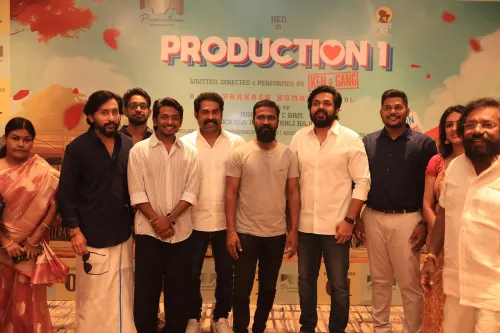What Are Shekhar Kapur's Thoughts on AI's Impact on Organizations and Jobs?

Synopsis
Key Takeaways
- AI is a transformative force, altering traditional job roles.
- Intuition will become the most valued skill in organizations.
- Hierarchical structures are being replaced by fluid group dynamics.
- Knowledge and education are increasingly accessible.
- Change is the only constant in the AI era.
Mumbai, Oct 23 (NationPress) Padma Bhushan awardee Shekhar Kapur, who frequently delves into realms beyond human perception, is exploring the implications of artificial intelligence during this 5th industrial revolution. He has shared his philosophical musings on the future landscape of organizations shaped by AI.
On Thursday, the filmmaker expressed his thoughts on X, formerly Twitter, in a detailed note reflecting on the intriguing world of AI.
He initiated the conversation with a thought-provoking question: "Will your organization endure the AI revolution?"
Kapur noted that AI represents one of the most democratic technologies accessible to humanity.
He articulated, "AI will transform everything. It’s an existential shift in how we live, work, and communicate. It's also a radical change in how we structure our organizations. Perhaps we should refrain from calling it ‘Structure’ since that implies stability. In the realm of AI, transformation is the only constant, occurring at an unprecedented speed. AI will eliminate inertia from existing frameworks, toppling hierarchical command systems and causing traditional ‘pyramidal’ structures to disintegrate."
He further questioned, "What does an organization resemble in an AI-driven world? Without hierarchy, command chains, or structure? One might ask, ‘Why do we need organizations?’ The answer lies in our inherent nature; like other living beings, we are tribal."
Kapur elaborated, "We are compelled to unite. The narrative of individualism propagated by various so-called gurus is misleading, as they themselves foster tribalism. Consider the 'murmurings of the sparrows'—flocks of hundreds or thousands of sparrows form intricate patterns in the sky, collectively adjusting their flight paths without apparent leaders. This phenomenon is guided by intuition. Each sparrow is intuitively linked to its group. Intuition will guide our organizational responses, and these groups will be fluid. Individuals will shift between tribes constantly. Therefore, the notion of permanent employees is outdated. Everyone will have the potential to be their own CEO, unlocking their unique capabilities. It’s no longer a matter of employees losing jobs; even CEOs face threats. This denial of reality is simply a lie that employers tell themselves, unable to confront the true impact of AI that is either on the horizon or already at our doorstep."
He continued, "Knowledge and information (including education) are no longer exclusive to a select few. AI guarantees access for everyone. As for experience? In this continually evolving world, experience may become a liability. Intuition is emerging as the most valuable skill in the AI landscape (sic)."
"Let’s be honest, intuition often arises from necessity. For instance, I find my creative peak in moments of panic. That urgency, that need, lies at the foundation of the pyramid, and like a volcano, change will erupt upwards, dismantling the pinnacle of the Pyramid. Welcome to the new world of AI."
#AI #Jobs #Structure #Intuition #Creativity #Change #Employer #Employee #ExistentialChange #CollapsedPyramid #MurmuringsOfStarlings #SocietalChange #Need #BottomOfThePyramid









